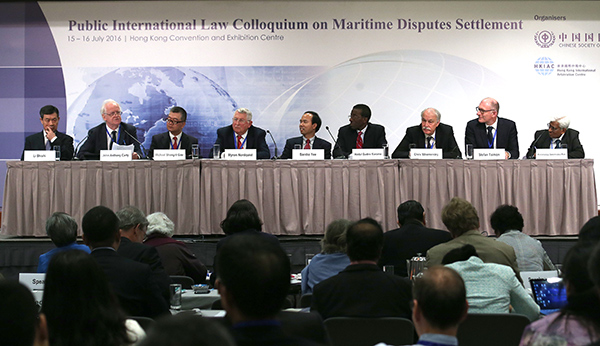International law experts continue to question South China Sea arbitration
By Shadow Li in Hong Kong (chinadaily.com.cn) Updated: 2016-07-16 16:39
 |
|
(L-R) Li Shishi - President, Chinese Society of International Law, John Anthony Carty - Professor, Tsinghua University, Michael Sheng-ti Gau - Professor, National Taiwan Ocean University, Myron Nordquist - Professor, University of Virginia, Sienho Yee - Professor, Wuhan University, Abdul Gadire Koroma - Former Judge, International Court of Justice, Chris Whomersley - Former Deputy Legal Adviser, Foreign and Commonwealth Office, Stefan Talmon - Professor, University of Bonn and Pemmaraju Sreenivasa Rao - President, Institut De Droit International, Former Chairman of the ILC at the Special Panel on the South China Sea Arbitration Initiated by the Republic of the Philippines during the Public International Law Colloquium on Maritime Disputes Settlement at the Hong Kong Convention and Exhibition Centre on July 16, 2016. [Photo by Parker Zheng/China Daily] |
World renowned scholars and experts on maritime disputes and ocean law questioned on Saturday a ruling by The Hague's Arbitral Tribunal of the Permanent Court of Arbitration that denied China's historical rights to the South China Sea, as a "wrong", "one-sided" and "political decision".
Myron Nordquist, a professor at the University Virginia, said a lot of things were wrong about the tribunal's award over the South China Sea dispute, particularly the fundamental flawed system to begin with.
Describing the arbitration as "one-sided", the veteran maritime law expert said a good award should be one with both parties' consent.
Nordquist made the remarks on the last day of a two-day forum in Hong Kong, titled the Public International Law Colloquium on Maritime Dispute Settlement. The high-profile seminar, organized by the Hong Kong International Arbitration Center and Chinese Society of International law, attracted more than 200 law experts from across the world to discuss the issue.
"It is a bad decision politically and this is a political decision," Nordquist said.
"It is a matter of whether the Article 298 (which grants a nation the right to declare issues that it does not accept compulsory arbitration) was honored."
Nordquist also believes the award's decision to declare all geographic features within the South China Sea as rocks or low-tide elevations "is not going to be well-received".
The tribunal, in its ruling on July 12, declared that the Taiping Island, also known as Itu Aba Island, was a rock, instead of an island, as it claimed. That has aroused questions and strong opposition from law experts.
"For example, Japan is going to be, in the end, unhappy with the way rock and island issue was handled by the Tribunal," Nordquist said. He cited the case of Okinotorishima, an island claimed by Japan and one even smaller than Taiping, as it might be put in an awkward position by the award.
Michael Sheng-ti Gau, a professor at the National Taiwan Ocean University, also questioned the award's decision on the rock and island issue.
"Taiping Island is internationally recognized by the academic world as island," Gau said.
"The Philippines carefully made their case around the delimitation by separating the issues into several portions. However, despite the effort by the Philippines, it is still in fact, undeniable, an delimitation issue when the Philippines petitioned to the tribunal over China's right to the South China Sea."
Given China's legitimate declaration in 2006 in Article 298 of the United Nations Convention on the Law of the Sea (UNCLOS), the tribunal has no right to rule on territorial disputes and delimitation issues and the award is in fact an act beyond the Tribunal's authority, concluded Gau.
The Philippines has put the dispute to the wrong place to settle, as the tribunal, acting under the UNCLOS, has no authority to touch on issues relating to territorial sovereignty disputes, Gau stressed.
- South China Sea arbitration award has no impact on China's territorial sovereignty
- State Councilor's interview on the so-called award by the Arbitral Tribunal for South China Sea arbitration
- US urged to reimburse Philippines over South China Sea arbitration case
- Li praises Cambodia's stand on South China Sea
- China sticks to two-way talks by relevant parties in solving South China Sea disputes




